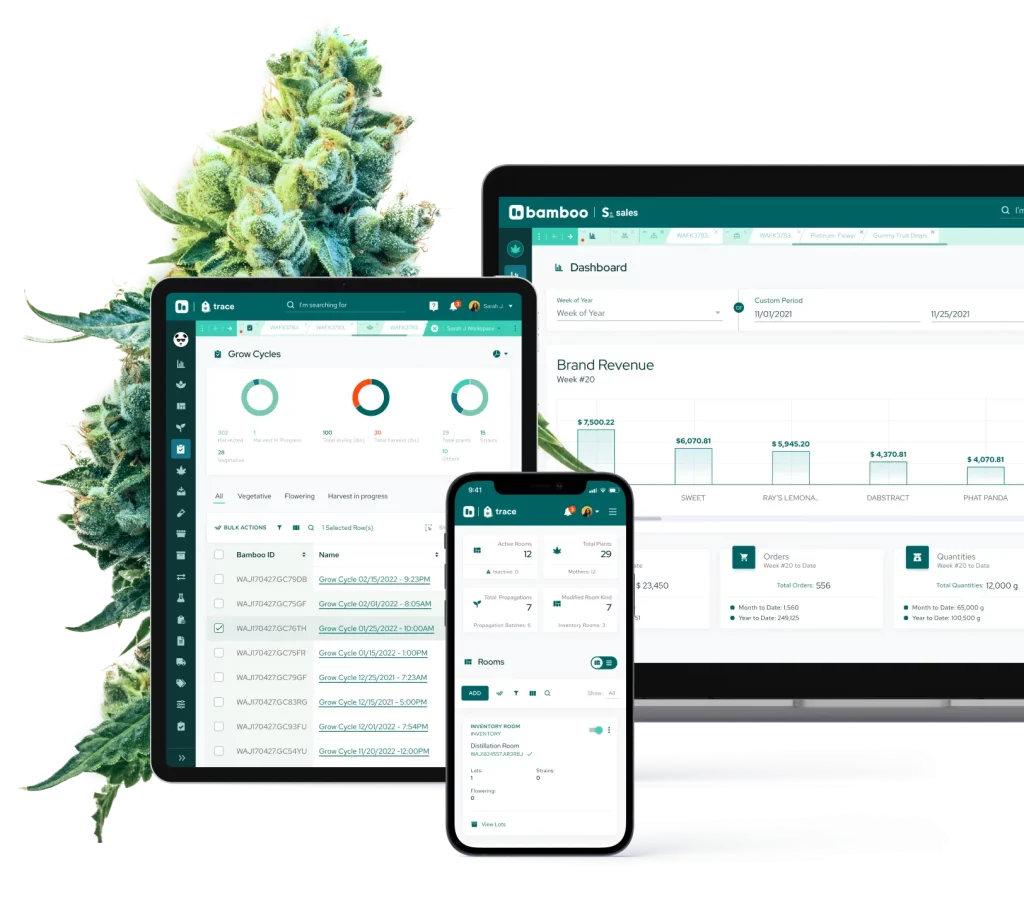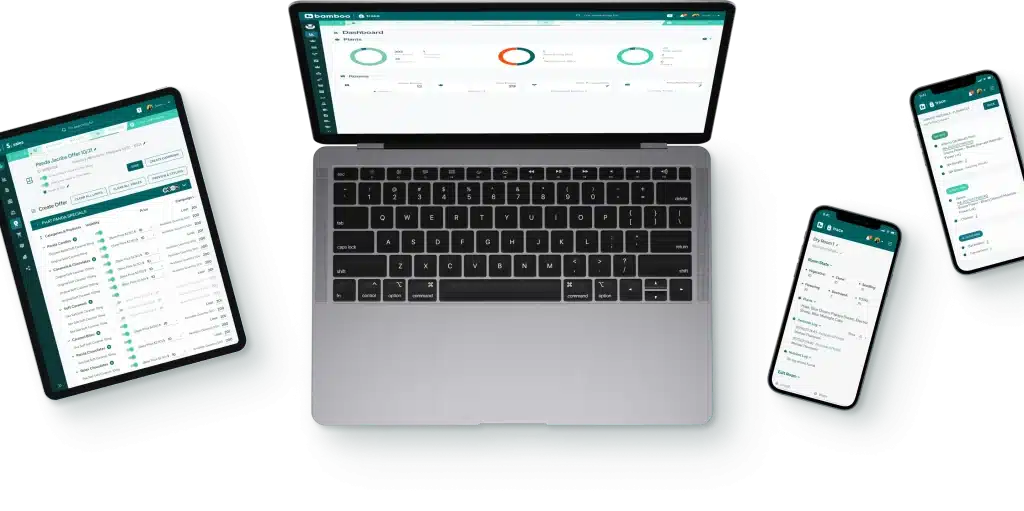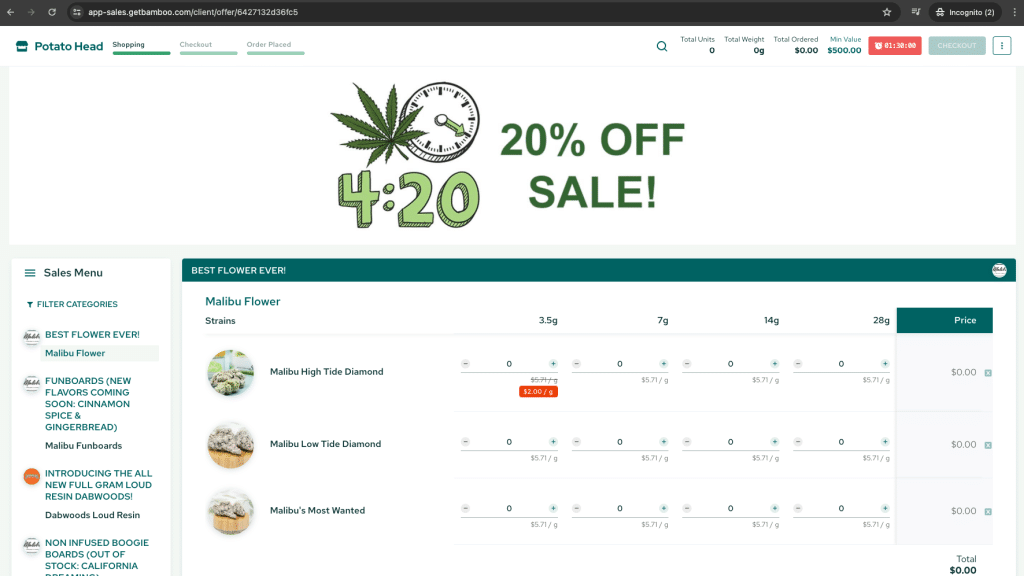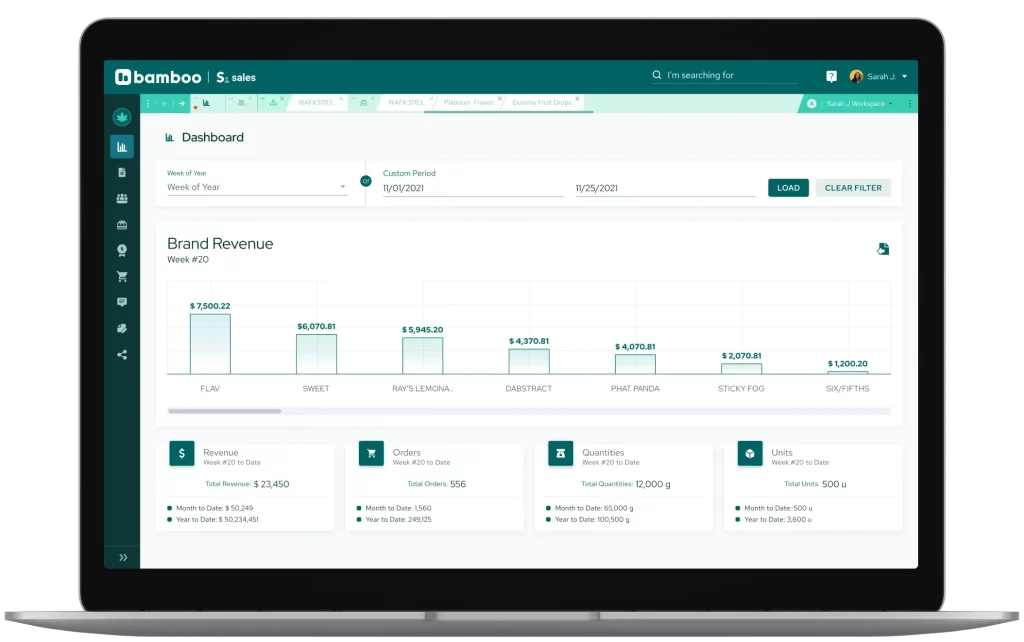Washington Seed to Sale Cannabis Software
Bamboo Trace provides a fully-integrated CCRS solution that streamlines all cultivation and processing tasks, simplifying every step of the way. Our customers have experienced remarkable efficiency improvements by utilizing Bamboo Trace.
Paired with Bamboo Sales, businesses have significantly improved productivity and achieved accelerated sales growth, making Bamboo the go-to solution for cultivation operations and sales teams in the state of Washington.

Washington's Recreational Market
Washington state, which legalized recreational cannabis in 2012, has one of the most established and mature cannabis markets in the United States. The market has continued to evolve and grow. Here’s an overview of the state’s recreational cannabis market based on the information available up to August 2023:
- Sales: Washington’s recreational cannabis sales have remained strong, with total sales expected to exceed $1.5 billion for the 2023 fiscal year. The market has shown resilience despite the challenges posed by the COVID-19 pandemic in previous years.
- Retail stores: As of August 2023, there were over 500 licensed recreational cannabis retail stores operating across the state, providing consumers with a wide range of options and easy access to products.
- Product innovation: Washington’s cannabis industry has continued to innovate, introducing new product categories and formulations to meet evolving consumer preferences. Edibles, concentrates, and topicals have gained popularity alongside traditional flower products.
- Pricing and competition: The state’s mature market has led to increased competition among producers and retailers, resulting in a general trend of declining prices for consumers. However, the market has also seen some consolidation, with larger companies acquiring smaller businesses.
- Tax revenue: Washington imposes a 37% excise tax on recreational cannabis sales, which has generated significant revenue for the state. In the 2023 fiscal year, cannabis tax revenue was projected to exceed $500 million, funding various state programs and initiatives.
- Social equity: Washington has taken steps to address social equity in the cannabis industry, implementing programs to support minority-owned businesses and communities disproportionately impacted by the war on drugs.
- Challenges: The state continues to face challenges such as the persistence of the illicit market, regulatory compliance issues, and public health concerns around cannabis use.
Washington’s recreational cannabis market is likely to continue its steady growth and maturation. The state’s experience serves as a model for other states looking to legalize and regulate recreational cannabis, while also highlighting the ongoing challenges and opportunities in the industry.
Why Do Washington Cannabis Businesses Love Bamboo?
Bamboo Trace seamlessly integrates with Washington’s CCRS seed-to-sale platform, offering a user-friendly and customizable interface that significantly reduces the time spent on data entry. With Bamboo Trace, manual inventory reconciliation becomes a thing of the past, empowering businesses to customize their cultivation and processing workflows effortlessly. The system ensures smooth sales and transfer manifests, particularly when integrated with Bamboo Sales, providing a comprehensive solution that complies with the LCB regulations from cultivation to product sale. Bamboo Trace stands as a beacon of transparency, accountability, and compliance within Washington’s legal cannabis industry, ensuring businesses operate seamlessly within the state’s established legal guidelines.
Washington's Road to Recreational Cannabis
Washington State was among the first U.S. states to legalize recreational cannabis, alongside Colorado. The road to legalization was paved by a combination of medical cannabis laws, shifting public opinion, and a well-organized ballot initiative campaign. Here’s a timeline of the key events:
- 1998: Washington voters approved Initiative 692, legalizing medical cannabis for patients with certain qualifying conditions.
- 2007-2008: The state expanded its medical cannabis law, establishing a registry for patients and designated providers and allowing for collective gardens.
- 2010-2011: Efforts to legalize recreational cannabis through ballot initiatives and legislation began to gain traction, with the emergence of the New Approach Washington campaign.
- December 2011: Initiative 502 (I-502), which would legalize and regulate recreational cannabis, was filed with the Washington Secretary of State.
- 2012:
- I-502 garnered support from various organizations, public figures, and law enforcement officials.
- On November 6, Washington voters approved I-502 with 55.7% of the vote, making Washington the first U.S. state (along with Colorado) to legalize recreational cannabis.
- December 2012: Provisions of I-502 allowing adults 21 and older to possess up to one ounce of cannabis took effect.
- 2013-2014:
- The Washington State Liquor and Cannabis Board (WSLCB) began developing regulations for the recreational cannabis industry, including licensing, packaging, labeling, and testing requirements.
- The WSLCB conducted a competitive licensing process for cannabis producers, processors, and retailers.
- July 2014: The first recreational cannabis retail stores opened in Washington, marking the beginning of legal adult-use sales.
- 2015-2023:
- Washington’s recreational cannabis market has continued to grow and evolve, with the state regularly reviewing and updating its regulations.
- The state has implemented various measures to promote public health and safety, such as packaging and labeling requirements, product testing, and youth prevention campaigns.
- Tax revenue from cannabis sales has been allocated to public health programs, education, and substance abuse prevention and treatment initiatives.
Washington’s successful legalization of recreational cannabis has served as a model for other states considering similar measures. The state’s experience has demonstrated the potential for a well-regulated adult-use cannabis industry to generate tax revenue, create jobs, and redirect law enforcement resources while promoting public health and safety. As the legal cannabis landscape continues to evolve, Washington remains a leader in shaping policies and best practices for the industry.
Washington Traceability's Route to CCRS
Washington’s Initiative 502, passed by a 56 to 44 percent margin in November 2012, marked a significant milestone in the United States. It made Washington the pioneer state to legalize recreational marijuana use. I502 paved the way for the official commencement of recreational marijuana sales in the summer of 2014. The Liquor and Cannabis Board was tasked to gameplan a solution to track the origin of the cannabis products. After bids were placed by numerous companies, BioTrack, a traceability software provider, was chosen by the LCB to track products from their origin. However, after the initial three years, the LCB opted not to renew BioTrack’s contract, citing various reasons.
On February 1st, 2018, Leaf Data Systems, a company under MJ Freeway, was introduced as the state’s new traceability platform. Despite its launch, it proved to be overly intricate, costly, and inefficient for the stakeholders involved, leading to massive amounts of dissatisfaction within the industry. Recognizing the need for a more user-friendly and efficient solution, the LCB decided to sunset Leaf Data Systems in 2021, paving the way for an in-house alternative. This new system, named Cannabis Central Reporting System (CCRS), aimed to simplify the complexities and challenges associated with traceability. CCRS was specifically designed to simplify the entire supply chain, making the traceability process easier, saving time, and reducing costs for all the parties involved.
- Initial Traceability System:
- In 2013, the Washington State Liquor and Cannabis Board (WSLCB) selected BioTrackTHC as the state’s initial traceability system provider.
- BioTrackTHC’s system was used to track cannabis from seed to sale, ensuring compliance with state regulations.
- Transition to Leaf Data Systems:
- In 2017, the WSLCB announced its decision to switch from BioTrackTHC to MJ Freeway’s Leaf Data Systems as the state’s new traceability system.
- The transition aimed to improve data collection, reporting, and regulatory compliance.
- However, the implementation of Leaf Data Systems faced challenges, including technical issues and delays.
- Development of CCRS:
- Due to the difficulties encountered with Leaf Data Systems, the WSLCB decided to develop its own in-house traceability system called the Cannabis Central Reporting System (CCRS).
- CCRS was designed to address the specific needs of Washington’s cannabis industry and provide a more stable and reliable traceability solution.
- Transition to CCRS:
- In 2020, the WSLCB began the process of transitioning from Leaf Data Systems to CCRS.
- The transition involved a phased approach, with licensees gradually moving to the new system.
- The WSLCB provided training and support to licensees to ensure a smooth transition.
- Current Status:
- As of 2021, all Washington cannabis licensees are required to use CCRS for traceability reporting.
- CCRS integrates with third-party software providers, allowing licensees to choose the solution that best fits their business needs while maintaining compliance with state reporting requirements.
- The WSLCB continues to work on enhancing CCRS to improve its functionality and user experience.
Why Bamboo for Washington?
Are you ready to transcend platforms like Growflow, Cultivera, Leaflink, and similar options? Bamboo seamlessly integrates with CCRS, automating the reporting for all compliance requirements. Plus, with Bamboo Trace, you can effortlessly create all your traceability and product labels within the platform. Bamboo Trace is complimentary for all Washington CCRS users, ensuring seamless traceability with integrated Bamboo Sales.
Numerous companies are embracing Bamboo’s proactive sales strategies, featuring user-friendly menus for effortless ordering. Our sales menu website integration is simple to set up and offers an additional revenue stream. Moreover, Bamboo empowers you to generate as many recommended orders as needed (buyers appreciate when reps do the legwork for them)! Bamboo Sales provides built-in extensive data analytics with customizable reporting and much more!
It’s time to elevate your operations with Bamboo.
Fed up with cannabis marketplaces? Had enough of Cultivera's marketplace?
Cannabis marketplaces serve as convenient platforms for buyers to explore a diverse range of brands and products, akin to flipping through a magazine or catalog. However, this convenience can inadvertently foster a competitive environment among sellers (cannabis brands), leading to a race-to-the-bottom mentality as they vie to offer the lowest prices to entice buyers to buy their products.
Platforms like Leaflink, Nabis, Cultivera, and GrowFlow, though beneficial in theory, often provide little beyond a showcase for brands. Sellers struggle to differentiate themselves out of hundreds of brands, limiting their ability to stand out.
Enter Bamboo: designed to empower cannabis brands by allowing them to customize their sales menus. With tools for creating personalized menus and recommended orders, Bamboo enables brands to capture buyers’ attention and drive higher sales. By focusing buyers’ attention on their specific brands and products (unlike a marketplace), sellers can cultivate greater engagement and larger purchases.
Ultimately, the success of a cannabis brand hinges on its ability to craft compelling sales menus and strategies. While marketplaces offer exposure, brands that take control of their sales approaches tend to enjoy greater long-term success.
Bamboo Trace
✔ Quick-action buttons available in every module for swift navigation and action execution
✔ Simplified traceability through real-time two-way synchronization with Missouri’s seed-to-sale system (Metrc).
✔ Receive instant notifications for important updates and events.
✔ Work in offline mode, accessible on both mobile and desktop devices, especially useful during periods of downtime in Metrc API systems.
✔ Ability to support multiple licenses for comprehensive management of operations.
✔ Customize label templates to meet Missouri’s Metrc regulations and efficiently generate multiple labels for various plant and product requirements.
✔ Comprehensive management of Strains, Rooms, Propagations, Grow Cycles, Plants, Harvests, Disposals, Inventories, Conversions, QA Samples, and more, all integrated within Bamboo Trace.
✔ Effortlessly process orders and generate manifests in just minutes for enhanced efficiency.

Bamboo Sales
✔ Utilize the finest Sales Menus available in Cannatech for enhanced sales strategies
✔ Seamlessly integrate Sales Menus with your website for expanded reach and accessibility
✔ Simplify email marketing efforts with the built-in feature tailored for sending sales menus effortlessly
✔ Gain insights through comprehensive sales analytics and reporting on clients, sales reps, and customizable metrics
✔ Generate numerous recommended orders (proposals) to cater to diverse client needs.
✔ Customize Real-time Sales Menus according to preferences and branding.
✔ Easily manage discounts, credits, pricing tiers, and distribution lists for streamlined operations
✔ Efficiently handle all your sales enablement strategies within the Bamboo Sales platform.

